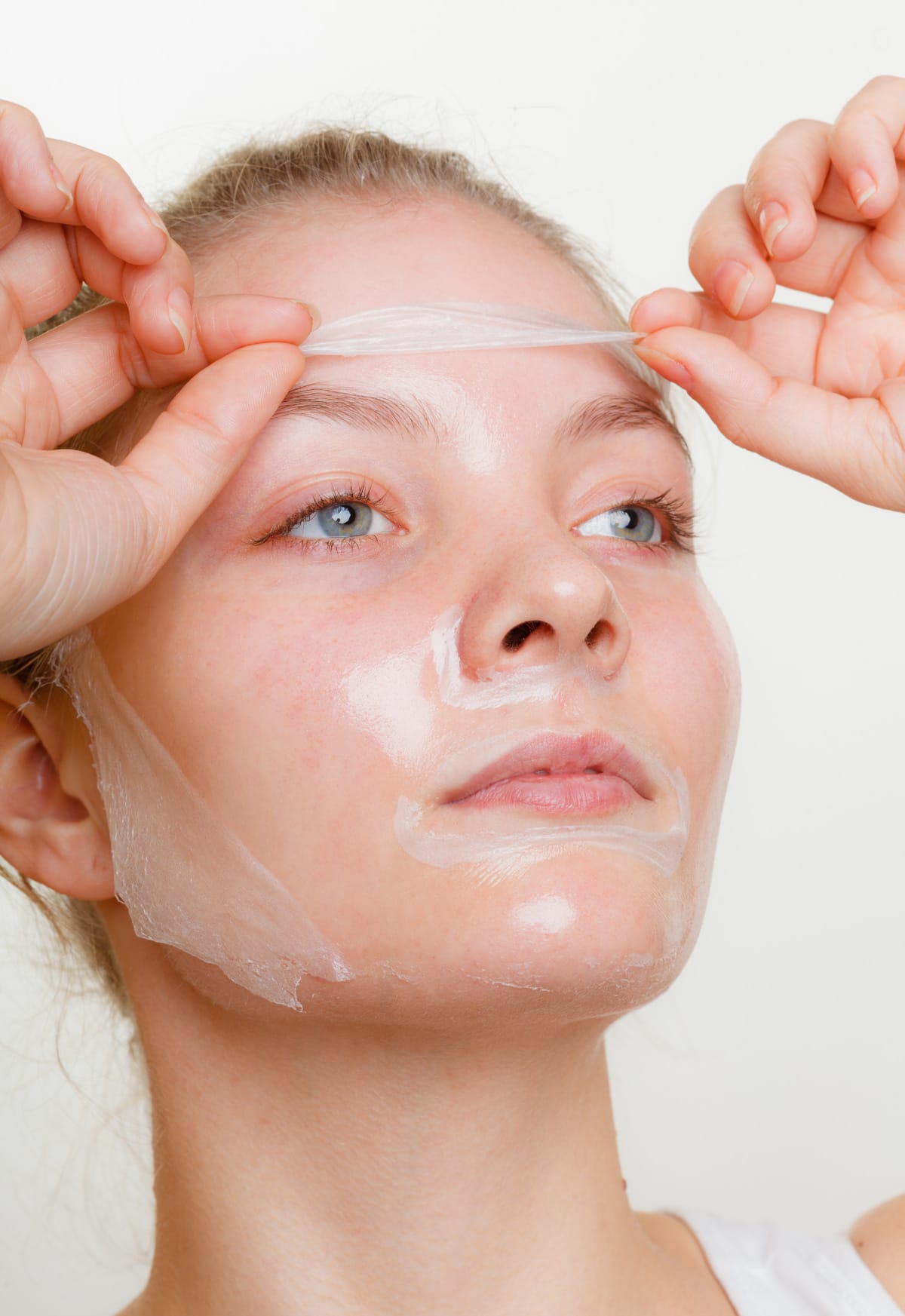
Ever had one of those moments when you’re just minding your own business, and then you notice something odd? Your skin is peeling!
It’s a pretty common issue but can leave you scratching your head – or, in this case, maybe your arm or face.
Now, before we dive in, it’s important to note that peeling skin isn’t always a sign of something serious. But it does raise questions: Why is my skin peeling on my face just like an old wallpaper shedding layers? Is it something I’m doing or not doing?
In this article, we’ll unravel the mystery behind why our skin tends to peel. From common causes to how weather impacts our skin health – we’ve got it all covered for you.
Why Is My Skin Peeling On My Face? Solving This Mystery
What Is Peeling Skin?
Peeling skin is when your body decides to shed some of your skin’s outer layer – a fancy term for this is ‘the epidermis.’ You see, it’s kind of like a renewal process where your skin tries to heal from any sort of damage.
The culprits behind the scenes could be environmental elements, various skin conditions, allergies, or infections. Sometimes, even certain diseases and treatments can lead to peeling.
And here’s something interesting – did you know that in medical terms, peeling skin is referred to as desquamation? Now that’s a fun fact for you!
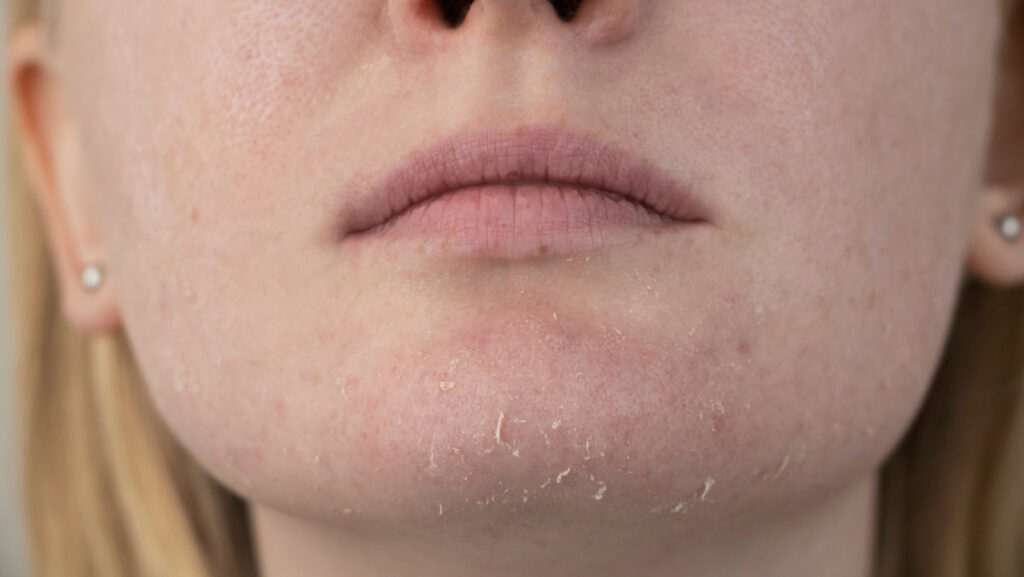
What Does Peeling Skin Look Like?
Wondering what exactly this infamous ‘peeled’ skin looks like? Well, it involves your epidermis – yes, that outermost layer we talked about earlier!
Despite being the thinnest layer on our bodies, our epidermis works super hard, protecting us against bacteria and germs while constantly making new cells (talk about multi-tasking!).
So, how do you recognize peeled or flaky (dry) skin? It might look:
- A bit irritated or inflamed
- Itchy (this one gets pretty annoying!)
Where Does Skin Peeling Usually Occur?
Now, let’s chat about where on our bodies we might see this peeling happening. Honestly speaking – it could pop up anywhere! Arms…shoulders…face, even your scalp – just pick a spot, really!
But don’t fret over randomness; there’s actually a method in madness here. The location where your peel party takes place gives us clues about what triggered it off in the first place.
So remember: if ever puzzled by unexpected patches popping up here and there — take note because they might just help pinpoint potential problems.
Is Skin Peeling A Sign Of Healing?
In some situations, when your skin begins to flake and peel, it’s actually a positive sign that your skin is on the road to recovery. This peeling can indicate the end of an irritating skin issue and the start of a phase where your skin is much calmer and healthier.
You might notice this peeling happening in a specific area, and initially, it may appear a bit reddish. However, as you continue to observe it over the days, you’ll see it becoming less irritated.
The boundaries of the peeling region tend to be gradually replaced by fresh, smooth skin. Plus, the itching sensation typically decreases as well.
This natural peeling or flaking process is your skin’s way of healing itself from various forms of damage. This damage could stem from exposure to environmental factors, underlying skin conditions, allergies, infections, or specific diseases and treatments.
So, while it may seem a bit concerning at first, it’s often a positive sign that your skin is actively repairing itself.
Why Is My Skin Peeling On My Face: Common Causes Of Skin Peeling
Ever wondered, “Why is my skin peeling?” There could be a myriad of reasons behind this. Let’s delve into some common causes that might just explain why you’re shedding more than usual.
Skin Damage
Believe it or not, your skin can peel as a result of damage. This could be from burns, friction-based irritation, or even sunburns.
Excessive exposure to the sun can lead to sunburns, which cause the top layer of your skin to peel off. Think about how lobster-red your shoulders got after that beach day without sunscreen and how they started peeling days later. That’s your body’s way of getting rid of damaged cells.
Warning: Call a doctor right away if you notice blistering over large portions of your body, fever, or chills that occur alongside a sunburn, allergic reaction, nausea, or dizziness.
Cold weather? Yep! It reduces the humidity levels, causing dryness, which eventually leads to peeling. Next time you’re enjoying a winter wonderland holiday, remember to moisturize!
Similarly, environments with dry air (like heated homes during winter) or taking very hot showers can suck the moisture right outta your skin, leading to – you guessed it – peeling!
Genetic Or Inflammatory Diseases
Sometimes, our bodies throw curveballs in the form of genetic or inflammatory diseases like Kawasaki disease and Peeling skin syndrome.
Certain infectious diseases can also lead to flaky friends popping up on our bodies. Group A streptococcal infections like scarlet fever, fungal infections, and staph infections such as impetigo or toxic shock syndrome are some examples where one symptom is often peeling skin.
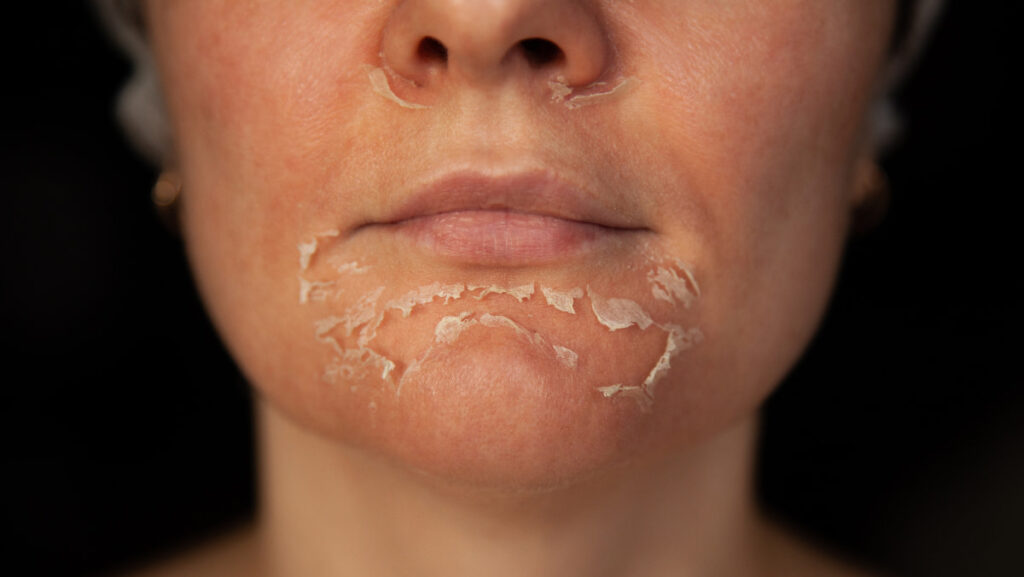
Skin Conditions
Our body reacts differently when faced with allergic reactions, including contact dermatitis, rashes, and Stevens-Johnson syndrome, among others – causing potential exfoliation.
Dryness caused by conditions such as athlete’s foot (tinea pedis), jock itch (tinea cruris), edema (fluid retention & swelling), pemphigus seborrheic dermatitis and other diseases like eczema, psoriasis, erythrodermic psoriasis might result in flaking.
Warning: Eczema, psoriasis, and more of these skin disorders can be found on your scalp, too. You may think that you’re just experiencing some dandruff, but it could be that you’re experiencing these conditions on your scalp. It is actually a common cause of peeling skin, aka what looks like dandruff, on the scalp!
Moreover, have you ever heard about the peeling skin syndrome? Peeling skin syndrome is a rare genetic disorder that causes the skin to peel continuously. It usually appears in newborns or infants, but it can develop later in life.
These specific conditions cause inflammation leading directly towards accelerated cell turnover, resulting in — well… flakes everywhere!
Skin Treatments
Skin treatments aren’t always gentle on us, either! Acne treatments, anti-aging creams, retinol creams, chemical peels, cancer treatments, radiation therapy, chemotherapy, certain medications, vitamins, and herbal supplements have all been known contributors to exfoliating effects.
Some medicines bring along side effects, including—you guessed it—peeled patches! Certain drugs may interfere with natural processes within our dermis layers, thus inducing unnecessary shedding.
If medication is playing villain, causing unwanted exfoliation, talk through options with doctors; they’ll likely provide alternatives better suited for sensitive skin while ensuring continued treatment effectiveness!
Essential Tips To Prevent Unwanted Skin Peeling
We’ve all been through that uncomfortable phase where our skin starts peeling off, leaving us wondering what we did wrong.
It’s not your fault; sometimes, it just happens due to a multitude of reasons, like harsh weather or lack of hydration.
But guess what? There are ways you can prevent it and keep your skin happy and healthy.
Adopting The Right Skin Care Regimen
The first step towards preventing unwanted skin peeling is adopting the right skincare regimen. Here’s how you can do it:
- Always make sure to cleanse your face with a mild cleanser twice a day.
- Exfoliate gently once or twice a week, but don’t overdo it, as this could lead to more harm than good.
- Hydrate! Keep yourself hydrated from within by drinking plenty of water, but also hydrate your skin by applying moisturizer daily.
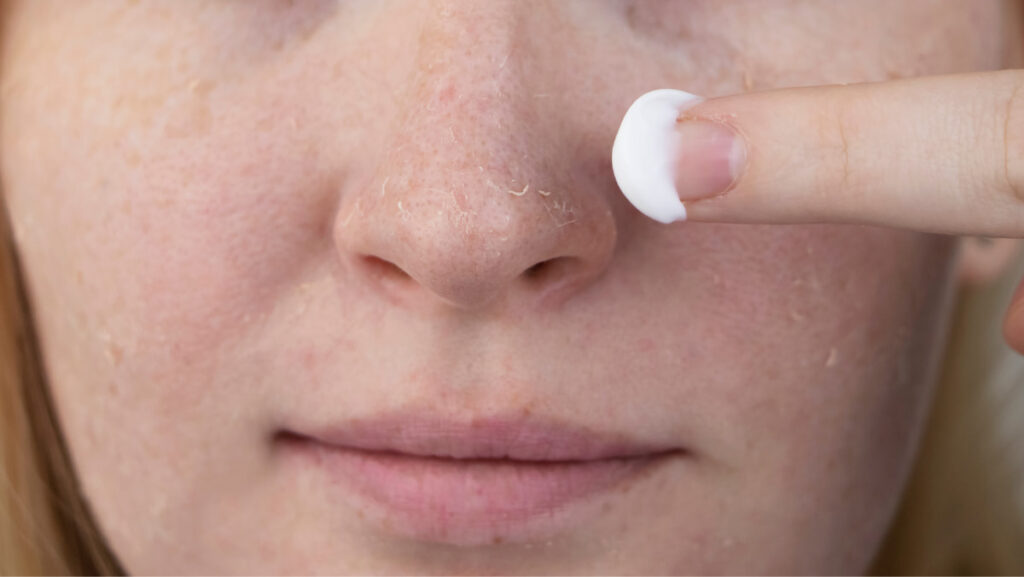
Choosing Skin-Friendly Products For Prevention
Next up on our journey is choosing the right products for prevention. This might seem overwhelming at first, with so many options out there in the market, but fear not! Here are some tips:
- Opt for products that contain ingredients known for their soothing and healing properties, like Aloe Vera or Chamomile.
- Avoid harsh soaps and products with high alcohol content as they tend to dry out the skin, leading to—you guessed it—peeling!
- Avoid or reduce the use of the following ingredients, as they can cause skin peeling: isopropyl alcohol, benzoyl peroxide, alpha hydroxy acids, salicylic acid, or retinoids.
- Try fragrance-free products, as fragrance skincare products can often irritate the skin.
- Try sticking with natural or organic products whenever possible.
Your choice of skincare products can truly make a difference!
Nourishing Your Skin From Within
Finally, let’s talk about nourishing our skins from within because, hey – beauty isn’t just skin deep, after all! Here’s what you should be doing:
- Include foods rich in vitamins A (like sweet potatoes) and E (such as almonds) in your diet since these help maintain healthy-looking skin.
- Stay away from overly processed food items, which might dehydrate your body, causing further damage.
Following these steps won’t only benefit your outer layer – trust me – but will also contribute significantly towards overall health!
Effective Home Remedies For Treating Flaky and Dry Skin
Have you ever looked down at your hands or legs only to be greeted by flakes of skin? Maybe you’ve even noticed scaly patches of dryness on your face. It’s not the most pleasant sight, right? Let’s dive into some solutions that can help.
Exploring Natural Remedies For Flaky Skin
Nature has a lot to offer when it comes to skincare. One popular remedy is honey; its antibacterial properties can soothe and heal irritated skin. Just slather it on the affected area, let it sit for about 10 minutes, then rinse off with warm water.
Aloe vera is another great option! Known for its healing properties, aloe vera gel can provide instant relief from flaking. And don’t forget coconut oil – this wonder ingredient hydrates while providing an anti-inflammatory effect.
Effective DIY Treatments for Dry, Peeling Skin
Who knew there were so many things in your pantry that could double as skincare products? For instance:
- Oatmeal baths are gentle enough even for sensitive skin types and can alleviate dryness.
- Yogurt masks are packed with lactic acid, which gently exfoliates and moisturizes.
- A sugar scrub (just mix equal parts sugar and olive oil) makes a cost-effective exfoliator that buffs away dead skin cells while leaving behind moisturized skin!
Everyone’s skin reacts differently, so what works wonders on one person might not work well on another.
Hydration And Its Role In Combating Skin Peel
Your body needs water – lots of it! It’s vital in maintaining healthy-looking skin. Without sufficient hydration levels, our bodies struggle to function optimally, leading to various issues, including dry, flaky skin.
Apart from drinking plenty of fluids throughout the day (aiming at around 8 glasses), incorporating water-rich foods like cucumbers or oranges into your diet also helps keep hydration levels up!
And remember: all those caffeinated drinks we love so much actually dehydrate us! So next time you’re reaching for that cup of coffee or tea, think twice if a clear, glowing complexion is what you’re after!
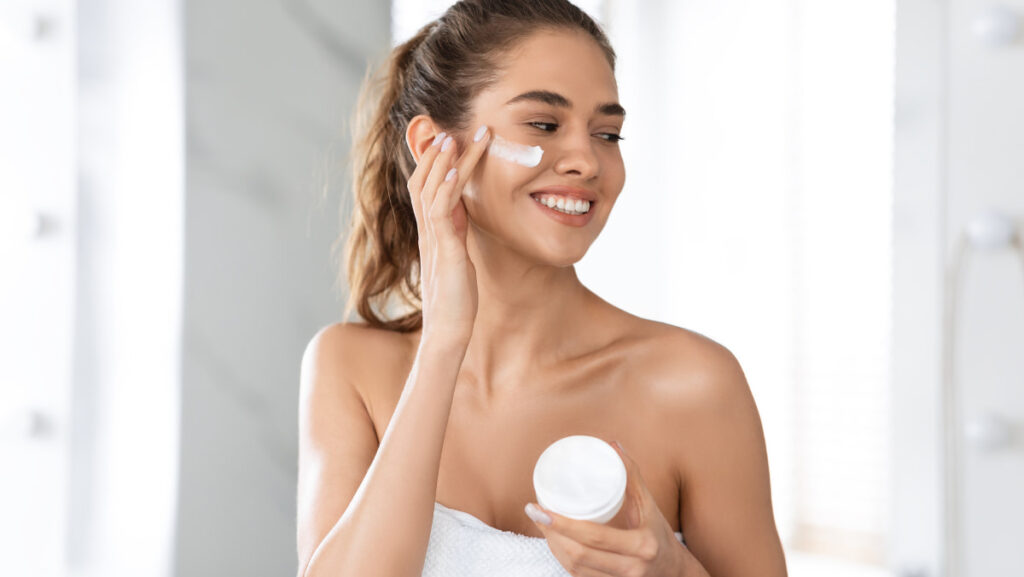
Conclusion: Maintaining A Healthy, Peel-Free Complexion
Your skin is your body’s largest organ, and it deserves the best care. It’s not just about looking good – a healthy skin barrier also helps protect you from outside elements. Peeling skin can be alarming, but remember that it’s usually a temporary condition.
By understanding what causes peeling skin, you’re already halfway to preventing it! Dryness, sunburns, or harsh skincare products are often the culprits behind this issue.
Here are some tips to maintain a healthy complexion:
- Stay Hydrated: Drinking enough water daily does wonders for your skin.
- Moisturize Regularly: Apply moisturizer every day, preferably one with SPF, to shield your skin from harmful UV rays.
- Gentle Skincare Products: Avoid harsh chemicals in skincare products as they can strip away natural oils, leading to dryness and peeling.
| Tips | Description |
|---|---|
| Stay Hydrated | Drink 8 glasses of water per day |
| Moisturize Regularly | Use SPF-infused moisturizers daily |
| Gentle Skincare Products | Choose products without harsh chemicals |
Sometimes, despite all precautions, you might still experience peeling. If that happens, don’t panic! Often, the solution is simple, like changing up your skincare routine or using an over-the-counter remedy.
But if problems persist or if your symptoms are severe (like painful red patches), don’t hesitate to seek professional help from a dermatologist.
Above all else, remember – beauty starts from within! Eating balanced meals full of fruits and veggies will keep both you and your complexion glowing!
